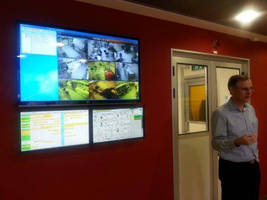LogiTag's Active RTLS Solution Selected by Hebrew University Nano Labs to Safeguards and Monitor Students and Staff

The unique system, installed by Orot Electronic Security, includes panic buttons and tracking capabilities to monitor every person entering the laboratory given the delicate working environment and enable a quick rescue during emergency situations.
LogiTag Systems, a leading provider of RFID solutions and high-value inventory management systems, announced today the successful installation of LogiTrack RTLS solution at the Unit for Nano Fabrication at Hebrew University of Jerusalem. The clean room laboratory contains state-of-the-art tools, and equipment to enable the Nanotechnology research and application into all fields including cancer research, agriculture, and high-tech. The carefully monitored environment can also present a safety concern to over 100 students and researchers given the various lethal chemicals and gasses being used – most of which only require an extremely small amount to create substantial life threatening situation, where each minute counts. This led the university to seek the most advanced panic alert combined with an online RTLS solution – LogiTrack. LogiTrack provides the facility a method to accurately monitor, locate, and trigger events based on location and status, which is vital in time-critical situations.
"The solution is built to provide three main functions," Said Nahum Greenman, CEO of Orot Electronic Security. "The first is the real time location of each person inside the lab. The second are the panic buttons, for use in case of emergency. The third is connectivity to the billing system, informing the university who used the lab and for how long.  We turned to LogiTag given their advanced capabilities, looking to integrate LogiTag's solution with the existing systems, and create a seamless system. Both the university and I now have peace of mind, knowing all safety measurements have been taken."
The way the solution works:
1.      A pre-authorized person enters the first and intermediate section of the lab with an ID card, wears the clean suit with LogiTag's advanced Active RFID Tags, and register into the system.
2.      The person enters the clean room, while their location is accurately displayed on a large screen at the building's entrance and accessible online in addition to the surveillance cameras spread throughout.
3.      Alerts and notifications are sent if the person remains inside the lab over a specific period of time, or presses the panic button. Other 'business rules' can be applied.
The Hebrew University Nanotechnology center is based on two units: The Unit for Nanocharacterization and the Unit for Nanofabrication. Both have been essential in supporting the unique discoveries of nanotechnology during recent years including cancer research, agricultural, and the high-tech fields.
Professor Shlomo Magadasi is one example of the type of researchers working at the University's Nanotechnology lab. His invention includes a permanent glass printing method, anticipated to impact the entire future of permanent in-glass printing.
Professor Oded Shoseyov is another researcher from The Robert H. Smith Institute of Plant Sciences and Genetics in Agriculture, using the center to research anti-angiogenic proapoptotic protein. Topics like Modification of plant cell-wall and fiber engineering in transgenic plants help him discover how to insert medicine within the protein of the plant – a practical study that has impacted the entire agriculture practice.
"We were seeking a solution to ensure our people's safety, so they can go about their important research" said Dr. Shimon Eliav, head of The Unit for Nanofabrication. "The panic buttons previously installed were not reliable as we had hoped, and didn't give us a complete solution. We take many precautions and provide extensive training to students using the lab, but we still needed to find an even safer solution. We can now save valuable search time in a situation where a student hits the panic button – we know who pressed it, where they are, and therefore send the dedicated personnel there. In addition, this information is available from any location, even at home during late hours of the night. This solution is ideal for any nanotechnology laboratory or facilities looking to safeguard their users".
LogiTrack is a Real-Time Location System (RTLS) that give facilities a method to accurately monitor, locate, and trigger events based on location and status. It can be used to manage assets, monitor patients, locate staff, call nurses, or monitor temperatures or humidity. Depending on the conditions, LogiTrack may activate alarms or close doors. It sends alerts (text messages, e-mails, and alarm) for informed, real-time decision making.
"We were extremely pleased to have been selected by the Hebrew University for this project," said Shlomo Matityaho. "It enabled us to prove once again our unique technological capabilities – specifically under such harsh environmental conditions as in the Nanofabrication lab. In order to maintain a clean-room environment, and eliminate RFI (Radio Frequency Interference), the lab walls are made of aluminum. The metallic walls are highly effective for the clean room, but present an obstacle when it comes to RF in general and RFID in particular. Given our extensive experience at dozens of locations and varied types of facilities (i.e. food conglomerates, high-technology organizations, hospitals…etc.), we were able to successfully overcome these challenges. I look forward to securing the safety of many more organizations."
About HUJI Nano Center
The Unit for Nanofabrication (UNF), headed by Dr. Shimon Eliav, which construction was finalized in summer 2007, is in the course of extensive equipment acquisition. The unit already provides some of the state-of-the-art tools for preparing nanoscale structures and devices, which enable the connection of nanoscopic objects to the macroscopic world. A special focus is given to processing of inorganic and organic nanomaterials including biomolecules. This unit combines two complementary approaches utilized for nanofabrication: the "Bottom-Up" approach that is inherent to nano-chemistry and the "Top-Down" approach commonly applied in modern microelectronics efforts to shrink down device dimensions.
The Unit for Nanoscopic Characterization (UNC) provides the "eyes" that researchers need to identify and characterize the nanometric structures they have created. The UNC is headed by Dr. Inna Popov and has a support staff of skilled scientists, engineers, and technicians who provide solutions to problems of material characterization on the nanometer scale.
About Orot Electronic Security
Orot specializes in planning, consulting, and installing low frequency systems in the field of monitoring and security. The company possesses over thirty years of experience providing innovative solutions to a variety of high-profile security projects including: four NY airports, the Middle East Safe City, Athens Olympic Games, and Better Place electric car. Orot's unique integration capabilities enable an end-to-end solution line to any protective requirement.
About LogiTag
LogiTag develops, manufactures, and markets intelligent, best-in-class RFID solutions and systems for tracking, monitoring, and managing inventory, assets, and people. LogiTag identified a growing need for advanced RFID technology with applications in healthcare, security, and enterprise. LogiTag's founders drew on their extensive knowledge and deep understanding of RFID, software, operations, and logistics to develop modular, Real-Time Location Systems (RTLS) and comprehensive hardware/software suites that integrate smoothly into lean manufacturing and operations.
Press Contact LogiTag:
Karen Shemesh
Online Marketing Director
Mobile: + 972 54 5277168
Tel: +972 9 8354848
karens@logi-tag.com
info@logi-tag.com
www.logi-tag.com
TwitterÂ




